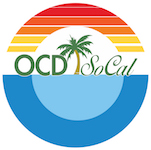I am writing you to inform you about an initiative to build a state of the art Obsessive Compulsive Disorder (OCD) Treatment and Research program in the Department of Psychiatry & Behavioral Sciences at the Keck School of Medicine of USC in Los Angeles. Please take a moment to read about this and if you know anyone who might be interested, please pass this letter along!
The program will offer extensive diagnostic evaluation, neuropsychological testing, medication management, individual and group cognitive behavioral therapy (CBT)- particularly Exposure and Response Prevention (ERP), and family-based interventions for OCD (that include ERP and behavioral contracting), personally tailored to the needs of each individual. In addition, we will offer transcranial magnetic stimulation (TMS) and deep brain stimulation (DBS) for those who qualify. The research component will explore cutting edge innovation in trying to understand the genetics of OCD, expression of the disorder and targeted treatments. I will oversee this program in tandem with a co-director, an internationally known expert on the Scientific Advisory Board of the International OCD Foundation (IOCDF). The program will be located on the grounds of the Health Science Campus of USC. We plan to accept most major insurances as well as self-pay.
Our initial goal is to raise $1 million dollars to fund renovations and build a prominent center that serves individuals with OCD and their family members in the greater Los Angeles area and beyond.
Prevalence and Background Relevance:
OCD is the 4th most common psychiatric disorder, affecting 8.5 million Americans, 240,000 of whom are in Los Angeles County alone. One in 40 adults and one in 100 children have OCD; it is as common as diabetes and asthma. The World Health Organization estimates rank OCD as the 10th leading cause of functional disability worldwide.
The first-line treatments for OCD include medication (serotonin re-uptake inhibitors) and cognitive behavioral therapy methods with a foundation of exposure and response prevention. Together, the response rates are approximately 50-60%. Patients who have tried those gold standard treatments and are not responding may be eligible for neuromodulation procedures such as TMS or DBS.
OCD treatment, though quite effective, is often underutilized due to lack of ERP specifically trained clinicians and access to care. In the greater LA area there are a number of clinics and private practitioners that offer components of treatment for OCD, but many of these are self-pay and on the West side of LA and thus not easily accessible for individuals living in other parts of the city.
Outcome and Impact:
Our intent is to be able to provide personalized ERP treatment plans for individuals with OCD and their families who would not otherwise receive this gold standard treatment. Given our skilled expertise and connectivity with the larger OCD community of providers and organizations, we hope to make our services available to not only people in Southern California, but also nationally. In addition to our clinical services, we will be conducting cutting edge clinical research to improve treatment outcomes while studying novel interventions.
Our overarching goal is to restore personal, social, work/academic functioning for millions of people who may otherwise not have the chance to improve their quality of life. It will also be our mission to provide psychoeducation about OCD, reduce stigma, and support advocacy.
Please join us in our initiative to bring these mental health services to Los Angeles and be among those who can envision a world in which people with OCD do not have to suffer without adequate, effective treatment!
Thank you for your consideration and I look forward to hearing from you.
Sincerely,
Barbara Van Noppen, PhD, LCSW
Vice Chair for Faculty Development
Associate Professor, USC Department of Psychiatry & the Behavioral Sciences
President, OCD Southern California, an affiliate of the International OCD Foundation
IOCDF Scientific Advisory Board Member
Mobile: 323-628-2802
Email: vannoppe@usc.edu
University of Southern California
Clinical Sciences Center, 2250 Alcazar Street, Suite 2200, Los Angeles, CA 90033 – Te: 323 442 4000 – 323 442 4003


